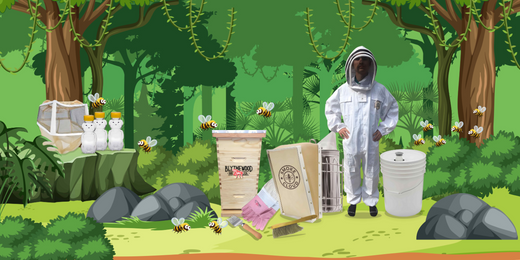
Selecting Hive Equipment - Tips to Starting Your Beekeeping Journey
Beekeeping is a rewarding and fulfilling hobby that not only provides you with honey and other valuable products but also contributes to the environment by supporting pollination. However, before you dive into beekeeping, it’s crucial to have the right hive equipment. The choices you make early on can significantly impact the health of your bees, the ease of hive management, and ultimately, the success of your beekeeping venture.
In this guide, we’ll explore the essential hive equipment you need to get started, how to choose the right products, and highlight some excellent options available at Blythewood Bee Company.
The Hive: Foundation of Your Beekeeping Operation
The first and most important piece of equipment you’ll need is the hive itself. There are various types of hives, but the most commonly used is the Langstroth hive, known for its modular design and ease of use. At Blythewood Bee Company, we offer a range of Langstroth hives, including the 10 Frame Deep Deluxe Expansion Kit, which comes fully assembled and ready for use. This kit includes a 10-frame brood chamber and 10 sturdy wooden frames, crafted from select-grade Southern yellow pine and fitted with Acorn’s industry-leading heavy-waxed plastic foundation. It’s an excellent choice for both beginners and experienced beekeepers.
When selecting a hive, consider the following:
-
Size and Capacity - Depending on your goals, you may choose a 10-frame or 8-frame hive. The 10-frame hive offers more space but is heavier, while the 8-frame is easier to handle but requires more frequent inspections.
-
Material - Wooden hives are the most popular due to their durability and natural insulation properties. Look for hives made from high-quality wood, like the Southern yellow pine used in Blythewood’s hives.
-
Foundation Type - The foundation serves as the base for your bees to build honeycomb. Plastic foundations with a heavy wax coating, like those offered by Blythewood Bee Company, ensure quick acceptance by bees and long-lasting durability.
Hive Tools: Making Management Easier
Managing a hive involves regular inspections, honey harvesting, and maintenance. To perform these tasks efficiently, you’ll need a set of essential hive tools:
-
Hive Tool - This is your go-to tool for opening the hive, prying apart frames, and scraping off propolis. Blythewood Bee Company offers durable and well-designed hive tools that are perfect for these tasks.
-
Bee Brush - A bee brush is used to gently remove bees from frames during inspections or honey harvesting. The soft bristles ensure that bees are not harmed.
-
Smoker - A smoker is an essential tool for calming bees during hive inspections. The Stainless Steel Bee Smoker with Guard available at Blythewood Bee Company is a high-quality option that ensures safety and efficiency during use.
Protective Gear: Safety First
Beekeeping can be a sticky situation—literally. Protecting yourself from stings is essential, especially when you're starting out and not yet fully comfortable around bees. Blythewood Bee Company offers a range of protective clothing that ensures your safety without compromising on comfort:
-
Bee Suit - A full-body bee suit provides the best protection. Look for suits made from durable, breathable materials. Blythewood’s Ventilated Beekeeping Suit with Fencing Veil is an excellent choice for keeping cool while staying protected.
-
Gloves - Bee gloves protect your hands from stings. Leather gloves are durable, but for more dexterity, consider Blythewood’s Goatskin Leather Beekeeping Gloves which offer a good balance between protection and flexibility.
-
Veil - If you prefer not to wear a full suit, at least invest in a good veil to protect your face and neck. The Round Veil offered by Blythewood Bee Company is lightweight and provides excellent visibility while keeping bees at bay.
Honey Harvesting Equipment: Preparing for Your Bounty
One of the most rewarding aspects of beekeeping is harvesting your own honey. To do this efficiently, you’ll need the right equipment:
-
Honey Extractor - For those with multiple hives, a honey extractor is essential for efficiently extracting honey from the comb without destroying it. The 2 Frame Stainless Steel Manual Honey Extractor from Blythewood is a great option for small to medium operations.
-
Uncapping Knife - Before you can extract honey, you’ll need to uncap the honeycomb. Blythewood’s Electric Uncapping Knife makes this process quick and easy, with consistent results.
-
Honey Bucket with Gate - After extraction, you’ll need a place to store and bottle your honey. A food-grade honey bucket with a gate, like the one offered by Blythewood, allows for easy transfer to jars.
Choosing the Right Equipment for Your Needs
When selecting hive equipment, it’s important to consider your specific needs, such as the size of your operation, your budget, and your experience level. Blythewood Bee Company offers a wide range of products suitable for both beginners and seasoned beekeepers, ensuring that you have everything you need to start and maintain a successful hive.
Selecting the right hive equipment is crucial to the success of your beekeeping venture. By choosing high-quality products from trusted suppliers like Blythewood Bee Company, you can ensure that your bees thrive, your honey production is efficient, and your beekeeping experience is enjoyable. Whether you’re just starting out or looking to upgrade your existing equipment, Blythewood Bee Company has everything you need to make your beekeeping journey a success.
Explore our full range of beekeeping products at Blythewood Bee Company and start building your perfect hive today.



Leave a comment